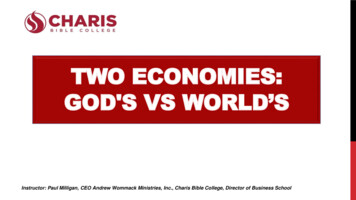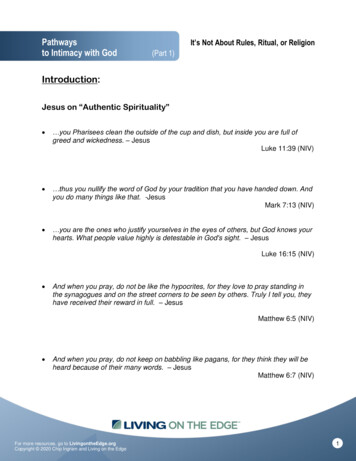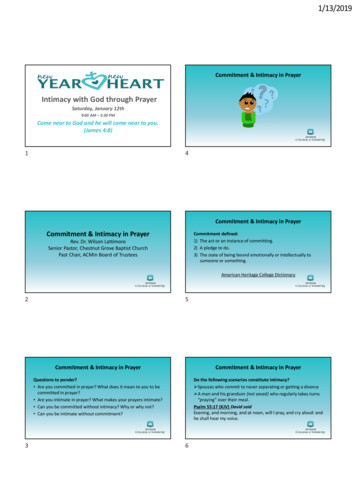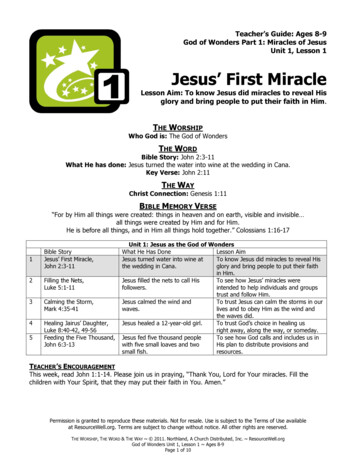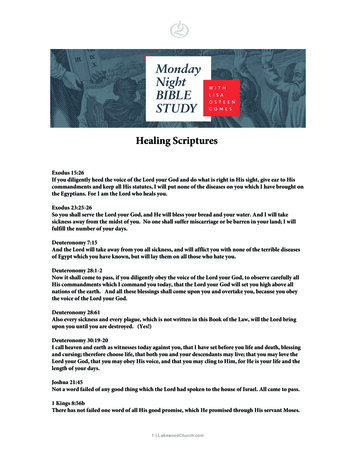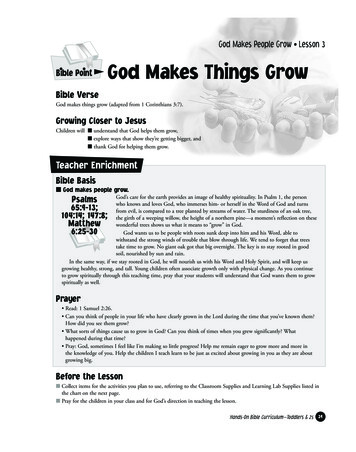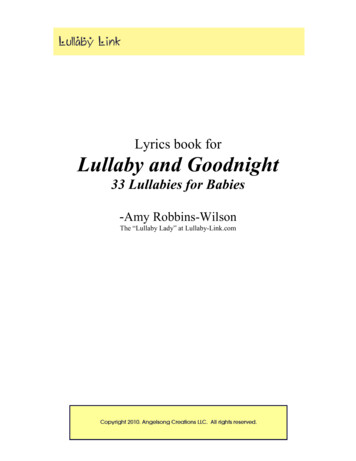
Transcription
finding godin all things:sacred moments in everyday lifefirst year academic convocationseptember 13, 2012with an address by dan barrygo set the world aflame!
the jesuit missionThe early Jesuits struggled to describe what they called “our way of proceeding.” Their distinctive spirituality can be seen as a three-part process. It beginswith paying attention to experience, moves to reflecting on its meaning, and endsin deciding how to act. Jesuit education, then, can be described in terms of threekey movements: being attentive, being reflective, and being loving. It results in thekind of good decision-making that St. Ignatius of Loyola, the founder of the Societyof Jesus, called discernment. Discernment enables each of us to seek the greatergood before us. Having this deep interior knowledge of the heart is to communicate with God and trust that the hand of God is at work fortifying and directing usin our lives. One of the many goals of a Jesuit education is to produce men andwomen for whom discernment is a habit.We can think of discernment as the lifelong process of exploring our experience, reflecting upon its meaning, and living in a way that translates this meaninginto action that creates a harmonious community for us all. We can also thinkof this process as something that we focus on with special intensity at particularmoments in our lives, for example, during the four years of college or when wehave to make important decisions. When we discern, we want to do so freely andwith a sense of what God is calling us to do.Through the practice of discerning, we grow in our ability to imagine howwe are going to live our lives and discover our vocations. The novelist and theologian Frederick Buechner describes vocation as “the place where your deep gladnessand the world’s deep hunger meet.” When we arrive at this place of convergence,we understand the fit between who we are and what the world needs of us; St.Ignatius urges us to be unafraid to live with the consequences of this realizationand to respond with generosity and magnanimity, because this is the way that wecan love as God loves.We are not solitary creatures. From the womb, we live in relationships withothers, growing up in cultural, social, and political institutions that others throughthe wisdom of their accumulated experience have created for us. To be human isto find our place in these relationships and these institutions, to take responsibilityfor them, to contribute to nurturing and improving them, and to give somethingback to them. Jesuit tradition uses the Latin word magis or “more” to sum up thisideal, a life lived in response to the question: How can I be more, do more, givemore? Having the courage to seek this wisdom is an important step in how we leadvirtuous lives.Excerpts taken from A Pocket Guide to Jesuit Education.
It is certainly the hope of Boston College, as a Jesuit, Catholic university,that students will feel at home here no matter what their background and beliefs.You are at Boston College because you belong here, and this place is now and shallbe part of your formation. From the multitude of experiences over the next fouryears, it is our hope that students will grow in expanding their hearts and minds,enriching their souls, and developing their talents, so they will grow in wisdom,faith, and love. Boston College also desires that students will come to know moredeeply God’s profound and abiding love for them and for all men and women, andthat all Boston College students will make their choices in light of that love for God.THE PRINCIPLE AND FOUNDATION FOR LIFEThe goal of our life is to live with God forever.God, who loves us, gave us life.Our own response of love allows God’s lifeto flow into us without limit.All the things in this world are gifts of God,presented to us so that we can know God more easilyand make a return of love more readily.As a result, we appreciate and use these gifts of Godinsofar as they help us develop as loving persons.But if any of these gifts become the center of our lives,they displace God and so hinder our growth toward our goal.In everyday life, then, we must hold ourselves in balancebefore all of these created gifts insofar as we have a choiceand are not bound by some obligation.We should not fix our desires on health or sickness,wealth or poverty, success or failure, a long life or a short one.For everything has the potential of calling forth in usa deeper response to our life in God.Our only desire and our one choice should be this:I want and I choose what better leads to God’s deepening of God’s life in me.From the Spiritual Exercises of St. Ignatius, paraphrased by David L. Fleming, S.J.
a way of proceeding in ajesuit universityOur perspective on the world affects our experience, and our experiencebecomes our sense of reality; therefore, this sense of reality influences how weinteract with the world. If we see the world as a cynical or loving place, this perspective embodies and becomes our understanding of our surroundings. St. Ignatius ofLoyola thought that the right vision comes from a trusting relationship with Godwho loves us.To think about this relationship with a loving God is a spiritual, intellectualactivity that we will ask all of our students to engage in as they embark on theirindividual and communal journeys here at Boston College. The choices and thedecisions that we make through the course of our daily lives either draw us closeror move us further away from God. St. Ignatius of Loyola discovered God’s lovethrough his quest for self-knowledge and personal sacrifice.Ignatius’s own spiritual growth happened in response to a difficult andpainful experience. In 1521 while defending the city of Pamplona against a Frenchattack, a cannonball struck his leg, causing a severe injury. During his subsequentrecuperation from two painful leg surgeries, Ignatius had a great deal of time toconsider his life and what he truly wanted and desired. While recovering, Ignatiushad access to only two books: the Vita Christi and the Flos Sanctorum. These literaryworks examined the life of Christ and the stories of the saints. From reading thesetwo books, one of the things that Ignatius came to understand from his conversion was that he was created by God. This conversion made something stir withinIgnatius’s heart. This stirring inspired him to rethink his view of the world and ofGod. Ignatius realized that he was created by God for a purpose, as are all womenand men.This new orientation for his life and his new understanding of God providedIgnatius with a more authentic understanding of reality, which gave him a newvision of himself. Ignatius’s vision of God was very tangible and personal. He hadseen and experienced God in such a profound way that he was now able to truly findGod in all places and in all things. This experience St. Ignatius describes in the FirstPrinciple and Foundation of the Spiritual Exercises: “All the things in this world arealso created because of God’s love and they become a context of gifts, presented tous so that we can know God more easily and make a return of love more readily.”
When we understand that God is love, it is foundational for us to understand that God loves us completely and fully. In order to deepen our understanding of this, Ignatius asks each of us to reflect upon and contemplate God’s love,which is the concluding prayer of the Spiritual Exercises. There is great value inreflecting upon all that we have within our lives: our family, friends, talents, andgifts. Through reflecting upon our experience, expressing gratitude, and havingpatience, we are better able to find and retain a perspective that helps us to shapeand model our lives. In many ways, a Jesuit education helps to direct each of usto continuously listen to our own heart. Being in the habit of understanding andresponding to our heart is how we become transformed and grow into people whowe want to become and who we are meant to be.As first-year students, you are embarking on a pilgrimage that has no setroute but does have a clear destination. To be authentic pilgrims, each of youmust engage in the intellectual and spiritual dimensions of the experience withan attentive, responsible, and loving heart. There are many roads and possibilitieson this pilgrimage from which you must choose; however, to reach the destination, you need to live authentically — you must live the life that dwells within you.To reflect daily upon your authenticity enables you to discern the right directionto proceed. Like Ignatius, you make good decisions when you examine and attendto the relationships within your lives. This discernment needs to be at the heartof your decision-making.finding god in all thingsWhen St. Ignatius founded the Society of Jesus, he chose to create an orderwhose members would work wherever the Church and world most needed them.Ignatius was convinced that God deals directly with us in our experience. This conviction rested on his profound realization that God works in all things that exist;therefore, our intimate thoughts, feelings, desires, fears, and our responses to thepeople and things around us are not just the accidental ebb and flow of our innerlives, but rather the privileged moments through which God creates and sustainsa unique relationship with each of us.In finding God in all things, we discover sacred moments in everyday life— grace-filled opportunities to encounter God in nature, our relationships, ouracademic pursuits, our own stories, and in the stories of those around us. In thesesacred moments, we realize our connectedness to God and how we are called toparticipate in the transformation of the world in both big ways and small.Excerpts taken from A Pocket Guide to Jesuit Education.
As you begin your life at Boston College, we invite you to reflect on yourown experience of finding God in all things and consider your individual desiresby examining the hope and perseverance demonstrated by the people in Bottom ofthe 33rd: Hope, Redemption, and Baseball’s Longest Game. Before reading this work,please reflect upon the following prayer by the late Superior General of the Societyof Jesus, Pedro Arrupe, S.J.:Nothing is more practical than finding God, that is,than falling in love in a quite absolute, final way.What you are in love with, what seizes your imagination,will affect everything. It will decide what will get you outof bed in the morning, what you will do with your evenings,how you will spend your weekends, what you read, who youknow, what breaks your heart, and what amazes you with joyand gratitude.Fall in love, stay in love and it will decide everything.To ask the right questions is to begin to experience discernment, whichneeds to be at the heart of all of our decision-making. We would ask each of youto ponder these key questions:What stirs inside of you?What are your deepest desires?Where do you find God in your life?
a historyThe First Year Academic Convocation and First Flight procession welcomeeach incoming class into the academic conversation already resounding throughout the Heights. The First Flight Procession that each student partakes in is an actof faith; faith that your classmates, the faculty, and the entire Boston College community will work together to engage a myriad of ideas that shapes your character,expands your intellect, and deepens your soul. As a student body, Jesuit community, and faculty collaboration, the event commissions all first-year students.In the same way that our freshman class is welcomed into the University, ourseniors follow the same route on their commencement day, as they are set forthinto the greater community of graduates, professionals, and alumni.Convocation and Graduation Ceremonies on Linden Lane.The First Year Academic Convocation looks to engage students intellectually, socially, and spiritually. As the tolling bells of Gasson Tower signal the start ofthe procession, the entire freshman class, gathered at residential halls, proceedsdown Linden Lane. Each residential community arrives in front of Gasson Hall,the first building, built in 1913, on the Chestnut Hill campus. It is within this storied tower that the early Boston College students were asked to discover their ownvoices in what was originally called the Recitation Hall. As a committed community, we will empower each of you to discover and cultivate your own unique voicehere on the Heights. To begin this pursuit, each first-year student is invoked byboth a Jesuit and lay educator to “Go Set the World Aflame.” St. Ignatius gave thissame charge in 1542 to St. Francis Xavier, who was carrying the Gospel to the East.
Traditions and rituals draw us into the experience of our lives. They alsohelp us feel connected to something larger than ourselves. The First FlightProcession, the blessing, and the lighting of torches are all part of how we look toconnect a 2,000-year-old Judeo-Christian tradition, a nearly 500-year-old Jesuit,Catholic order, and a 150-year-old institution, Boston College. As we feel part ofsomething larger than ourselves, it is important to recognize the camaraderie andthe companionship that we form among ourselves and how that connects to thealumni who have come before us. We also want each of you to come to realizethat as members of the BC community, we believe in you. It is our hope that inthe four years that pass between Convocation and Graduation, you will becomeattentive, intelligent, loving, and compassionate people who are committed tosomething greater than yourselves.St. Ignatius attempted to model a life and provide a path alongside Jesusthat would enable each of us to examine our lives in a tangible way to pursuethe most profound questions. The Society of Jesus as well as the faculty, administrators, and staff are here to be your companions in contemplative action asyou search for truths in your life and the world around you. Developmental psychologist Erik Erikson asked the questions, “Who am I, and how do I fit into thisworld?” It is through many conversations at Boston College that you will begin toanswer these major questions in your life.Torch lighting during First Flight Procession.
the book and its authorAs the class of 2016, each of you will have the opportunity to read Bottom ofthe 33rd: Hope, Redemption, and Baseball’s Longest Game and to welcome author DanBarry to Boston College to discuss his work. As the subtitle of the book suggests, Barryuses the longest game in baseball history as a backdrop to tell the stories of hope andperseverance of the individuals who were a part of that historic night, inviting readersinto the grace-filled moments of the everyday life of the players, managers, and fans.The game of baseball is embedded into ournation’s ethos and in no place more than in the cityof Boston. The game provides a secular, but oftensacred place, where the struggles, grief, joys, andexhilaration of the experience provide momentsof self-transcendence for both the players and thespectators alike. Through Barry’s description andnarrative approach, this book invites the readerto search for inspiration within everyday life bysuggesting that a personal encounter with God iswithin the grasp of humanity each day in this complex and often challenging world. If we identify thegrace of God working within the lives of the peoplewithin this book, we can begin to pay attention to the work of the Spirit within ourown lives.Dan Barry is a writer for The New York Times whose column This Land tells thestories of individuals across our country, highlighting the sacred moments in theireveryday lives. These features bring readers to small towns and big cities, with talesabout family-run car dealerships impacted by the changes in the American auto industry, towns nearly vanished from the map with the end of coal mining, the far-reachingeffects of the Gulf oil spill, the last days of a death-row prisoner, the hometown celebration for an Olympic medalist, and Barry’s personal story of his battle with cancer.Dan Barry has won several awards, including the George Polk Award forjournalism, the Pulitzer Prize for an investigative series, the American Society ofNewspaper Editors Award, and the Mike Berger Award from the Columbia UniversityGraduate School of Journalism.Barry is a graduate of St. Bonaventure University and New York Universityand has written two other books, Pull Me Up: A Memoir and City Lights: Stories AboutNew York.
a way to approach the textAs you enter into this Jesuit, Catholic University, we will ask each of you toengage in a conversation, to live together, and to share your life with one another. Asmembers of the Class of 2016, your conversation will begin with this book, whichinvites us to consider the human condition by telling the story of the longest game inthe history of baseball and the intertwining stories of the people who were a part of it.Set within McCoy Stadium in Pawtucket, Rhode Island, which is only forty minutessouth of Boston College, the narrative and story are intrinsically linked to the neighborhoods that once prospered and have subsequently struggled. Even in the midst ofthis grittiness, hope and possibility are ever present.Barry introduces us to people at every level of the baseball organization — thebatboys, players, managers, owners, and fans — over the course of the 33 innings.Through their own recollections, we hear of the relationships, struggles, and triumphsby bearing witness to the sacred moments in their everyday lives. In these sacredmoments, we see God in the fundamental human condition emerge in those relationships expressed through hope, perseverance, and failure.As you prepare to read the stories of the players, managers, fans, and the cityof Pawtucket, we invite you to consider your own story — the sacred moments in youreveryday life as you reflect upon these questions:As A Pocket Guide to Jesuit Education shows us, St. Ignatius was convinced thatGod deals directly with us in our experience. This conviction rested on his profound realization that God is “working” in everything that exists. Where haveyou encountered God in the people and things around you? Where might youhave overlooked God’s presence in your everyday life? How can you be moreattentive to God’s presence in the world around you at Boston College?“Hope is an intimate matter” (p. 13). Hope becomes a central theme in thisbook — individual hope for a victory in this longest of games and for a chancein the major leagues, and communal hope for one’s team, one’s city, and one’sfamily. What are some of the hopes that you bring with you as you begin yourtime at Boston College?Jesuit Father Timothy Brown once wrote, “Hope is not the same as that feelingthat things are going well or that eagerness to invest in activities that are obviously going to succeed early on. Rather hope is the ability to work for something because it is good, it is right, not just because it is apt to be a success. It is
a way to orient our lives, a way to be part of building the kingdom of God thatis anchored just over the horizon and within our hearts.” How do the peopleand players in Pawtucket sustain their hope? How will your hopes help orientyour life to building God’s kingdom? How do you hope to pursue the good inyour life at Boston College?The baseball game at the center of this book takes place on “Holy Saturday, theawkward Christian pause between the Sorrow and the Joy” (p. 3). As JesuitFather Kevin O’Brien reflected, “ we know as Christians that the shadows ofGood Friday will yield to the dawn of Easter morning. And so the suffering anddeath of Jesus must always be remembered and lived in context of the hopethat springs eternal, the hope of Easter morning.” Where do you see redemption in the lives of the people in this book? Where have you experiencedmoments of redemption in your own life? Where does the hope of Eastermorning live in your life?“Hope, after all, is the motto of Rhode Island” (p. 132). What situations in theworld today call upon us to have hope in the face of despair? With whom dowe share those hopes? Who are the people in our world and in our lives whohelp bring wholeness to our own broken lives?Throughout the book, we see examples of people who try; whether theymeet with success or failure, they persevere. “Imagine, then, how many havedreamed of playing in the major leagues, if only as a backup to the backupcatcher in the bullpen. Hundreds of thousands? Millions? Yet by the end of the1980 season, just twelve thousand men had ever realized that dream. Twelvethousand; their bodies and ghosts would not fill a third of Fenway Park” (p. 13).Despite the odds of making it to the major leagues, these players continue tostrive for that goal. What does it feel like to work toward such a goal, regardless of the outcome?Mother Teresa once said, “God doesn’t require us to succeed, He only requiresthat you try.” How have you tried and failed in your life? How has that allowedyou to be reborn? Are there moments when you have learned more from failure than success?In telling their stories, these players often describe success in even the smallestvictories. “In no way does this suggest that Steve Luebber will become somekind of baseball sad sack. For one thing, he will return to the major leaguesa couple of months after this game in Pawtucket, if only briefly he will have
won six games in the major leagues by the time his career ends, which is sixmore than most of us will ever win honor is found in having come so close”(p. 108-109). Are there experiences in your own life that you see as failures?Do these experiences seem different in retrospect? Have you experienced joyin striving for something that you have not reached? Are you able to see success in having come close? To see grace in a moment after it has passed?In a story about Bruce Hurst, Barry writes, “Here is a man who has the willpower not to succumb to the seductive clubhouse culture; who sets himselfapart by knowing what he does not want to do with his days and nights.But this isn’t to say that Hurst necessarily knows what he does want in life;his consuming self-doubt is well-known in the Red Sox organization .Justthree weeks ago, in fact, Hurst quit — again. After making it late into springtraining with the Boston Red Sox, he was cut from the major-league rosterand sent back to Triple-A. He returned to his apartment, wept, and decidedto retire, even though he was only twenty-three. These were the ‘darkestdays of my life’” (p. 172-173). As you begin your time at Boston College, howwill you decide what you want to do? How will you persevere when facedwith your own personal darkness? How does one listen to and discern theirvocational calling?Abiding commitment and perseverance is not only evident on the baseballfield in this book, but also in the stands and beyond the walls of the stadium.Of the pact that he and his father made to stay through the end of the games,Danny Card said, “I learned what a promise meant” (p. 145). What does apromise mean to you? What promises have you made to others in your life?Are there promises which you have failed to keep?“At one point Brex retrieves a foul ball that clatters in the gape of empty seatsseveral rows behind him, the first he has ever snagged at a baseball game: atrophy. But racing over from the third-base side comes a boy, maybe ten yearsold and a few seconds late in the pursuit of the same foul ball. He looks atBrex with an expression that blends sleep deprivation with a baseball yearning, and what can the man do but surrender the ball to the boy. Then a youngwoman, either the girlfriend or wife of one of the Rochester players, noticesBrex sitting alone, and walks over to hand him a cup of coffee. Two quiet,unifying gestures. Community” (p. 169). There are numerous encounters inthe book in which people search for connectedness — both at the game andbeyond. How are people connected in this book through God’s grace? In whatways have you reflected upon the multitude of connections that exist in your
own life? As you enter Boston College, to whom do you feel connected? Yourfamily? Your friends? How will these connections change over the course ofthe next four years?“Because we are bound by duty. Because we aspire to greater things. Becausewe are loyal. Because, in our own secular way, we are celebrating communion,resurrection, and possibility” (p. 14). Where do you connect into momentsof sacredness within your daily life? How do you pay atttention to thosemoments? How to you reflect upon them?Sesquicentennial Mass at Fenway ParkAs Boston College recognizes its founding 150 years ago, its SesquicentennialCelebration will officially begin with a Mass at Fenway Park in Boston. The Mass isopen to all members of the Boston College community — students, faculty, staff,alumni, and their families — and will be concelebrated by members of the Jesuit community and alumni priests. It will be followed by a reception that will include a walkingtour of the ballpark.This year’s Convocation book and address will connect into this Mass at FenwayPark. It is our hope that each of you will attend this special occasion that marks thestart of Boston College’s Sesquicentennial Celebration by immersing yourself in the100-year history of Fenway Park and the 150-year-old Jesuit tradition of Boston College.
As you enter into Boston College, we would invite each of you, regardless ofyour personal religious beliefs, to be open to the gifts of God’s grace, which St. Paulrefers to as the fruits of the Holy Spirit. These fruits are love, joy, peace, patience, kindness, goodness, faithfulness, gentleness, and self-control.As we begin the school year and Sesquicentennial Celebration, we pray thatthe Holy Spirit continues to fill our hearts with the fire of God’s love, which can betterenable each of us to “Go Set the World Aflame.”continuing the conversationAs you enter into this Jesuit, Catholic, liberal arts university, you must considerhow we live in the 21st century and how the world is growing rapidly and changing inunforeseen ways. In the midst of this globalized and technologically driven world, weask you to critically evaluate all that has come before us. To enter into the Universitycore curriculum is to enter into a foundation of knowledge and experiences that willbetter equip each of you to synthesize and adapt to the ever-changing world that youare part of each day. Being able to read, write, and think critically will be importantbuilding blocks within your academic journey here at Boston College.To fully embrace your Jesuit, Catholic education, you also need to considerhow you will grow in your own understanding of faith. There are many conversationpartners, including the Jesuit community, who are here to aid you within this journeyand quest for understanding. Boston College hopes that each student will deepentheir individual faith over the course of their years here. There are a number of sacredplaces within our community where you can go to contemplate and recognize God inall things.We would encourage you to seek out these sacred places on our campus:www.bc.edu/prayermap.We would ask that you begin this path by reflecting on the following —
Patient TrustAbove all, trust in the slow work of God.We are quite naturally impatient in everythingto reach the end without delay.We should like to skip the intermediate stages.We are impatient of being on the way to somethingunknown, something new.And yet it is the law of all progressthat it is made by passing throughsome stages of instability—and that it may take a very long time.And so I think it is with you;your ideas mature gradually—let them grow,let them shape themselves, without undue haste.Don’t try to force them on,as though you could be today what time(that is to say, grace and circumstancesacting on your own good will)will make of you tomorrow.Only God could say what this new spiritgradually forming within you will be.Give Our Lord the benefit of believingthat his hand is leading you,and accept the anxiety of feeling yourselfin suspense and incomplete.—Pierre Teilhard de Chardin, S.J.
The Merton PrayerMY LORD GOD, I have no idea where I am going.I do not see the road ahead of me. I cannot know forcertain where it will end. Nor do I really know myself,and the fact that I think I am following your will does notmean that I am actually doing so. But I believe that thedesire to please you does in fact please you. And I hope Ihave that desire in all that I am doing. I hope that I willnever do anything apart from that desire. And I knowthat if I do this you will lead me by the right road, thoughI may know nothing about it. Therefore I will trust youalways though I may seem to be lost and in the shadowof death. I will not fear, for you are ever with me, and youwill never leave me to face my perils alone.—Thomas Merton, “Thoughts in Solitude” Abbey of GethsemaniWhat do you plan to do with the opportunity that awaits you here at Boston College?
As you enter into your first year of college,it is important to examine the decisions thatyou make while here at BC. Taking time toreflect upon your motivations, your desires,and your fears will give you a better perspectiveon your life—where you came from, whereyou are presently, and where you are heading. Boston College hopes to partner with youduring this journey through the carefuldiscernment of the intellectual, spiritual, andsocial components that affect you during yourundergraduate journey.Go Set the World Aflame!
boston collegefirst year experience78 college road, brock housechestnut hill, ma 02467phone: 617-552-3281800-355-5853fax: 617-552-3968bcfye@bc.educonversations in the first year:a program of the office offirst year experience
God. Ignatius realized that he was created by God for a purpose, as are all women and men. This new orientation for his life and his new understanding of God provided Ignatius with a more authentic understanding of reality, which gave him a new vision of himself. Ignatius's vision of God was very tangible and personal. He had

